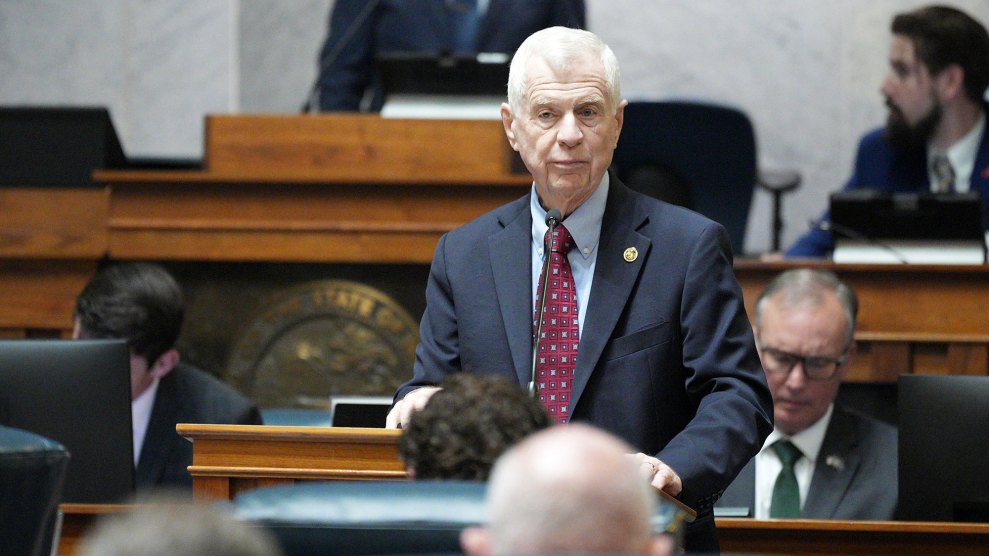Could a federal judge’s ruling against health reform’s individual mandate actually help the law survive? Hudson’s decision dealt the biggest legal blow to the federal health law to date, and he could be joined on Thursday by another conservative district judge who’s slated to rule on the mandate in Florida. But Hudson’s ruling also dashed the hopes of the law’s biggest opponents, who were hoping to stop the entire law in its tracks before it reached the Supreme Court.
Virginia Attorney General Ken Cuccinelli, who brought the suit against the law, had tried to convince the court to enjoin the entire law to prevent it from being implemented. Hudson declined to do so—a decision that health reform advocates went so far as to declare a victory. “The victory is more significant than the loss—the legislation will continue to be implemented around the country,” says Ron Pollack, executive director of Families USA, a health reform advocacy group.
The federal government has already begun the massive undertaking of putting the early stages of the law into effect, cajoling state regulators, insurers, and other major players to move along. Hudson’s decision to let the entire law—including the individual mandate, with its 2014 start date—remain in effect will help ensure that “the process will move forward,” Pollack adds. Republicans could use the protracted legal battle to drag their heels on complying with the law and enforcing its regulations on the state level. But most of the time they won’t have a choice, and the more provisions that go into effect, the harder health reform will be to repeal—even under a completely GOP-controlled Washington.
Moreover, Hudson made it clear that his decision to rule against the individual mandate did not invalidate the rest of the federal law. Reform advocates have worried that a legal slip-up would make it impossible to “sever” the individual mandate from the rest of health reform—and that if that one provision went down, so would the rest of the law. Hudson’s decision left supporters breathing a little easier about the federal law’s future.
So even if the worst case scenario came to pass and the Supreme Court struck down the individual mandate, reform supporters sound more confident that they’d be able to salvage the law. Removing the individual mandate on its own, without accompanying changes, would end up unraveling some of the biggest changes under the law: without being required to purchase insurance, many healthy individuals might decide against insuring themselves—driving up costs and making it prohibitively expensive for insurers to protect sick individuals with pre-existing conditions, as another part of the law requires.
But reform advocates say they have a few back-up plans to salvage the law and the insurance regulations that would be threatened if the mandate is eliminated. One would be an opt-out rule that would allow people to forgo insurance, but which would offer the benefits under health reform to those who chose to be covered—including government subsidies to buy insurance and regulations that would prevent them from being denied coverage.
The GOP itself created a similar mechanism for its massive Medicare Part D overhaul, making more benefits available to those who decided to enroll and remain in the program, Pollack points out. Such incentives would entice more healthy people to enroll, helping to ward off the mandate-free health reform (a disaster scenario that would likely result in skyrocketing premiums, among other thing). Some Democrats had floated such options while health reform was still being debated, wary of the consequences of the unpopular mandate provision. “The individual [mandate] is the most effective,” Pollack adds, “But it’s not the only way.”
What’s more, Republicans could end up having to devise or endorse such a solution themselves as soon as 2012 if the mandate, and nothing else, is struck down, given the threat to the private insurance market if it gets taken out. As The New Republic‘s Jonathan Chait points out, the insurance lobby will also be pressuring legislators to act under such a scenario. “Republicans, you celebrate the victory today that a major component of Obamacare was struck down, but what it means is that you have to roll up your sleeves,” one Capitol Hill source tells Politico. “When the house of cards is crumbling, you have to come up with something that has to replace it, short of the individual mandate.”
















